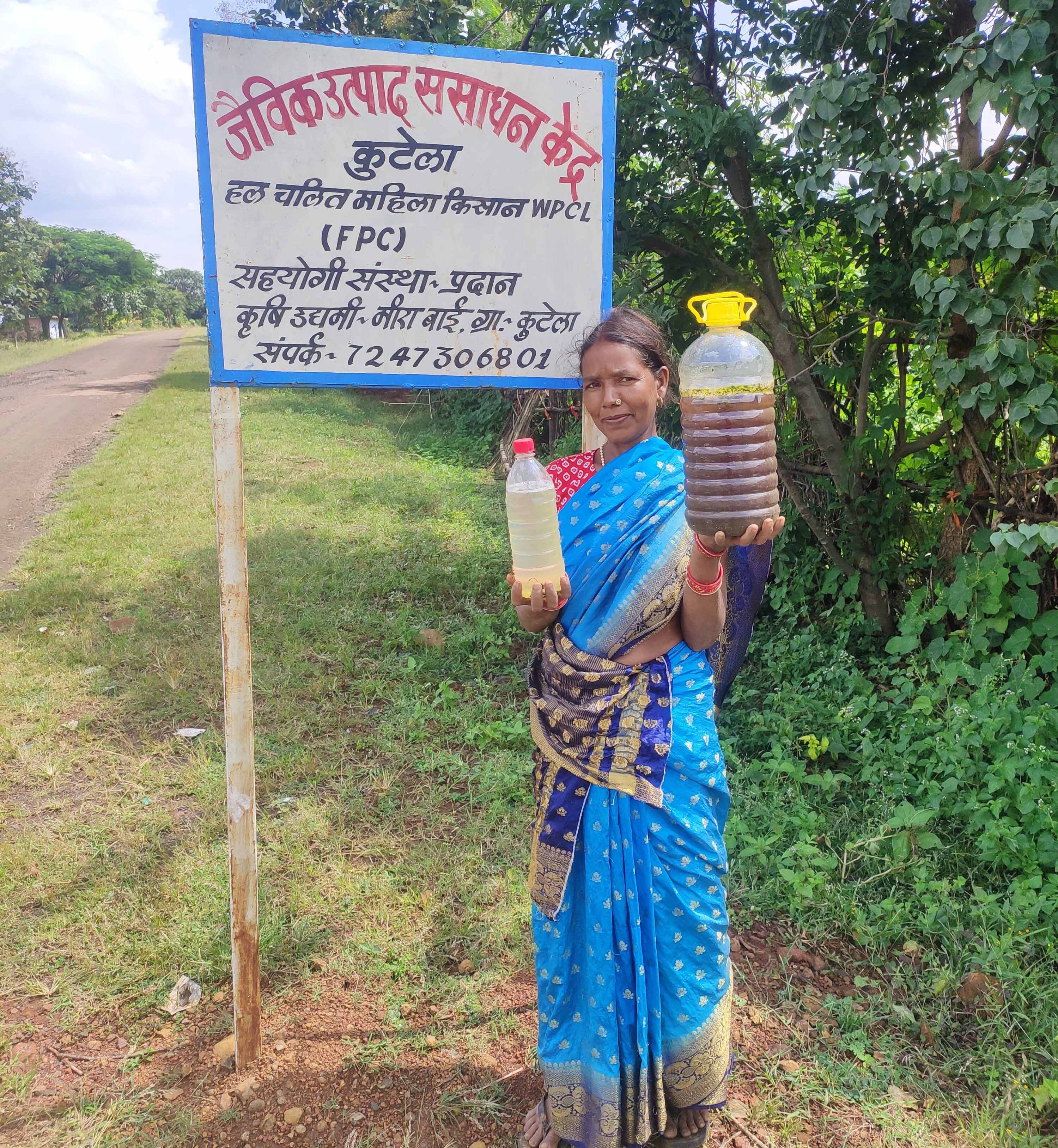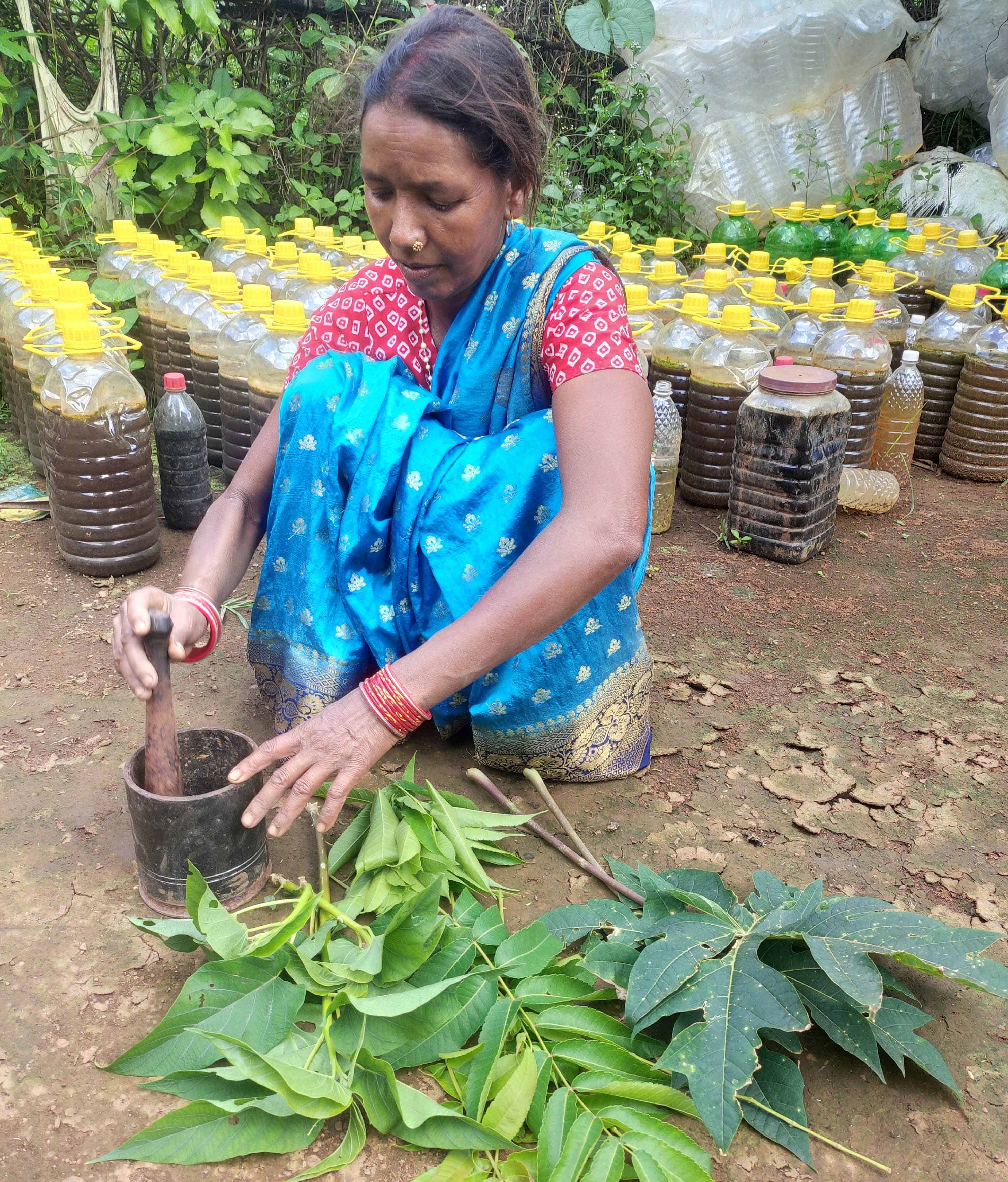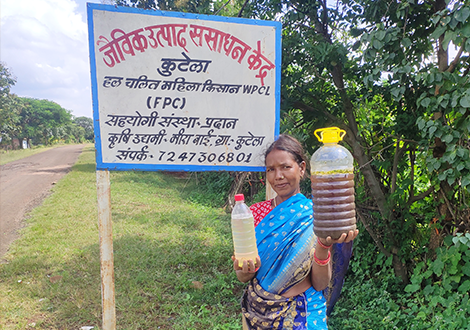A conversation with Meera Devi: A businesswoman
by Meghna Mukherjee (MetaMeta Research),Shubham Jain (MetaMeta Research),Vinitika Lal(Pradan)
Meet Meera Devi from Kutela Gram in Dindori District in Madhya Pradesh, India. Meera has been running a Bio-Resource Centre (BRC), which makes and supplies organic inputs like biofertilizers and bio-pesticides. A BRC is a small organization promoted by PRADAN, an NGO working in the most underdeveloped regions in India. The objective behind promoting a BRC was to have a centralized system of producing and distributing organic fertilizers and pesticides among other farmers in rural areas.

How did Meera Devi become a Bio-Resource Center manager?
Meera Devi worked as an Ajeevika Sakhi (literally translating to Livelihood Friend) before starting her business as a BRC manager. As an Ajeevika Sakhi, she received training on the benefits of organic agriculture and the role a BRC can play in promoting organic agriculture. She slowly realized the financial impact of running a BRC on her personal life. Meera recalls, "Earlier, I used to ask for money from moneylenders, and it was not a good feeling. Then I joined a self-help group and would take money on loan from there and repay the money on time. I felt good. I am running this Bio-Resource Centre, and I can proudly say that I am earning a good amount of money to support my family. And this is the best feeling."
When asked if financial independence was the only thing that inspired her to take up this role, she nodded in disagreement. She added that through the training, she was made aware of the harmful effects of chemical fertilizers on the crops. And as a farmer, she has witnessed firsthand how soil quality has deteriorated over the years. "I wanted to promote good agricultural practices among farmers, and that is why I started making different organic products and supplying them to farmers." Currently, Meera Devi is involved in making four different products: Matka Khad (Clay Pot Fertilizer), Vermiwash and Waste Decomposer as biofertilizer to enhance soil productivity, and Agni Astra, as Organic Pesticide to control pest attack. The application of Diammonium Phosphate (DAP), a widely used chemical fertilizer, and Urea, the most common nitrogen fertilizer in India, has deteriorated the soil and is hazardous to human health. These chemical fertilizers are expensive, while the organic fertilizers made at her BRC are less expensive. "It is my goal to supply low-cost natural fertilizers and pesticides to farmers in and around my village," she adds.

The challenges Meera Devi faced in her journey
But was everything easy and smooth in her journey from Ajeevika Saathi to a BRC businesswoman? Reflecting on her journey, Meera Devi said she faced many challenges. When she first proposed the idea of starting a BRC, the first challenge was collecting funding. While most of the self-help groups members agreed to join at first, everyone took a step back a few days later. But Meera Devi was confident. She knew running her own business center for a good cause would reap her returns. She says, "I discussed my problems with my family. My husband was very supportive. He encouraged me to take a loan, and he also took a loan so that we could fund the investment." After gathering money, she procured the required materials to start her business. And within a short time, she could repay her and her husband's loan. However, things got more challenging. The raw materials required to make the different fertilizers and pesticides take a lot of work.
Water, cow dung, cow urine, and other green leaves are not easy to find, collect and store. The village did not have a secure water supply. To fetch water, women have to walk and carry water from long distances, which is cumbersome. Also, raw materials like neem leaves and others are difficult to accumulate. Making theChilli and garlic pastes that are added involves hard work. Collecting cow urine and dung is the most difficult as it must be planned and arranged before making bio-fertilizers and bio-pesticides. The women who collect cow urine must be informed before making it, as they can manage only a certain amount daily.
What is Meera Devi’s motivation and how does she see the future
Despite facing these challenges, Meera Devi is cheerful. She believes that awareness raising on the benefits of natural fertilizers is necessary. Once farmers are aware, training would be essential regarding how to apply it, in what quantities, and when. She is hopeful that her products will have a good customer base. She feels that women farmers should adopt natural fertilizers to improve their family's health and reduce the land's degradation- even if it's on a mere 0.5 acres of land, they should start applying it.
Meera Devi is proud of her journey and the kind of impact she has been able to make through her business. She reflects that the business has helped her become more assertive. She has interacted with people from all over the world and is now recognized as a businesswoman. She is respected in her society, and her opinion is considered valuable for matters of importance. When asked where she sees herself in the next 5 years, she smiles coyly and says, "My business expanded to 54 villages in my block where PRADAN is involved."


